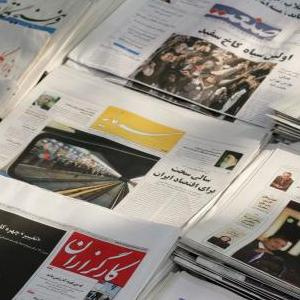Tehran’s Daily Newspapers’ Review

Quasi-Government Companies Win, Private Sector Loses(1)
Kayhan
Washington’s Hasty Efforts to Change the Iraqi Nation’s Elected [Premiership] Candidate: undermining Maliki, propping up Allawi, in U.S. officials’ visit to Baghdad
Zionist Military Fight with Palestinian Adolescent in West Bank
Resalat
Hojjatol-Eslam Panahian: The Next Fitnah(2) Will Use Religious Literature
Jalali [Rapporteur of the Iranian Parliament’s National Security Committee]: 40 proposals by MPs to safeguard nuclear achievements
In an Interview with ISNA [Iranian Students’ News Agency]: Collaboration between two clerical entities [Society of Seminary Teachers of Qom and Association of Combatant Clerics] for principlists’ unity
Shargh
400 Billion Tomans [approx. 385 million USD] of Bounced Checks
Two Principlist MPs Stated: Identifying and Suing [Political] Extremists
Time Limit for Copyright Annulled: A bill for the blue-blooded(3)
Tehran-e Emrooz
Plans to Stop Blocking of Iranians’ Assets: Enter Trade Promotion Organization of Iran
Shiites’ Farwell with Lebanon’s Allameh(4): Ayatollah Fadhlollah passes away at 75
Vatan-e Emrooz
Features of the Next Fitnah according to Panahian
Three Days of National Mourning declared by Hezbollah: Allameh Seyyed Mohammad Hossein Fadhlullah passes away
(1) On May 22, 2005, Iran’s Supreme Leader released a new strategic document obliging the administration to privatize government companies. The process has so far failed to meet the expectations, as many believe the shares are ceded not to the private sector, but to entities indirectly under the government’s control.
(2) Fitnah –a Qur’anic term meaning ‘trial’- is used to describe a situation in which discerning the wrong from the right becomes extremely difficult. The term was used to describe the last year post-election rift between Iranian political forces for the first time by the Supreme Leader, later to be widely used by many principlist political figures against the Green Movement.
(3) The original term ‘borzorg-zadehgan’, or its more popular variant ‘agha-zadegan’, is a disapproving term widely used in Iranian political literature to describe sons of famed political or religious figures who supposedly enjoy an advantage over ordinary citizens due to their father’s stature. Yesterday, Majles –the Iranian parliament- modified the copyright law after principlist MP Ali Motahhari –son of the assassinated revolutionary cleric and intellectual Ayatollah Morteza Motahhari- demanded that the copyright of his father’s books remain within the ownership of his family.
(4) Allameh is an honorary title applied to a knowledgeable person, typically a cleric (or a man of letters).

